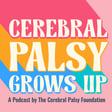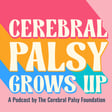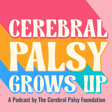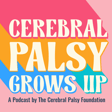Become a Creator today!Start creating today - Share your story with the world!
Start for free
00:00:00
00:00:01

Episode 7: Jae Kim
Jae Kim is a social worker from Washington State. She has cerebral palsy, and believes deeply in disability justice and disability rights. She also uses an AAC (Augmentative and Alternative Communication) device in order to answer questions.
Cerebral Palsy Foundation on Instagram: @yourcpf
CPGU on Instagram: @cerebralpalsygrowsup
Credits
Host: Alexa Orban
Producers: Katy Gaastra, Kyle Khachadurian
Executive Producers: Ashley Harris Whaley, Rachel Byrne
Graphics: Briana Raucci
Transcript
Introduction and Mission
00:00:10
Speaker
Welcome to Cerebral Palsy Grows Up. Join us as we explore the unique experiences and stories of adults living with cerebral palsy. We hope this podcast helps you feel a sense of camaraderie and community.
Advocacy for Disability Rights
00:00:23
Speaker
Today, we have Jaykin, who is a social worker and lives in Washington state. She works every day with the disability community and believes that services like education, housing, and employment are a basic need to which all people should have access.
00:00:39
Speaker
This is also why she wanted to study social work, to advocate for people with disabilities. Jay also runs Smooth Talkers, a monthly meetup for people who use communication devices and support groups for people with disabilities. I was looking forward to this conversation with Jay all season as we both work in the accessibility space. I felt our shared passion for the work we do and loved her insights on the future of accessible tech.
00:01:05
Speaker
Jay uses an AAC device, which is a tool that supports her communication. This includes how she answered her questions on this episode. Let's dive in. Hi, Jay. Welcome to the Cerebral Palsy Grows Up podcast. We're so excited to have you today. And to kick off the conversation, we'll ask for a brief self introduction.
Role as Program Manager
00:01:25
Speaker
Hi, my name is Jay and I have Cerebral Palsy, which means that I can't control my body very well.
00:01:34
Speaker
This includes limitations on my pronunciation, preventing me from communicating verbally. Due to this, I'm in a powerized wheelchair and use an AAC device to communicate with people.
00:01:49
Speaker
So nice to meet you officially and get to know you a little bit more. And I'd love to dive into your work. So you're a social worker and you're working for a disability rights organization in Seattle. Can you share more about your role with our listeners and what you do on a daily basis? I work for a nonprofit organization where we support various individuals with disabilities and their families in King County areas as a program manager in my room.
00:02:16
Speaker
I lead a dedicated team of three professionals focusing on managing our information and referral team. My primary responsibility is to ensure that we deliver accurate and effective support to individuals with disabilities, helping them navigate the resources and services available to them.
00:02:38
Speaker
I also play a key role in organizing and hosting various events aimed at increasing awareness and understanding of the disability system. These events provide valuable opportunities for learning and engagement, and I regularly give presentations on a wide range of topics related to disability rights, resources, and advocacy.
00:03:03
Speaker
Wow. So it seems like your role is public facing and really hands-on. You lead consultations and workshops and work collaboratively across teams. Can you tell us the biggest way that your disability impacts your work?
Personal Stories and Advocacy
00:03:17
Speaker
My disability has taught me the importance of educating others about disability justice so they can advocate for the disability community effectively.
00:03:28
Speaker
I've found that sharing personal stories is a powerful way to help people understand how disability impacts civil rights. I hope that by doing this, they'll educate the others. I wish advocating for disability rights were a one-time solution, but it's an ongoing challenge. Like many social issues, a lot of people are still unaware of disability history and rights.
00:03:55
Speaker
of my own experiences, I understand the variety of support people need and why it's important to recognize and embrace those differences. Viewing these issues from the perspective of someone with a disability is essential to me. Yeah, and I agree with you on sharing stories. I think that's a huge reason that we're here today on the podcast, right? It's to just have so many diverse experiences and just meet so many amazing people that can share a piece of their life. And so for you to not only do that in your day to day, it's amazing. And I know for me, I work in the disability space and I also share my personal story online. So there's just so much crossover between our personal lives and our work. Can you talk about any challenges or ableism that you face at work or navigating your disability at work?
Experiencing Ableism Daily
00:04:48
Speaker
Ableism is something that I encounter daily.
00:04:51
Speaker
especially because my visual disability is quite noticeable. While my colleagues are generally respectful, I often face challenges with others. For instance, some people speak to me in a condescending tone, treating me like a child because of my disability rather than seeing me as an individual. Others address my caregiver or coworkers instead of talking directly to me.
00:05:20
Speaker
Many people also make assumptions about my communication device without taking the time to understand how it works, leading them to think I can't communicate. This experience can make me feel like an invisible presence, but not really seen. I can definitely see that. And so personally, I work for an accessibility tech company. It's a little tidbit about my background and where I'm at in the disability space. and It's something that I've seen, you know, just meeting just a diverse spectrum of disabilities. And when you're immersed in it, and I think that this is what so many people need to understand is that disability is a human experience. And so when we come to it and we realize that it truly is at the core who we are as humans and we connect with people, it just makes such a big difference. So I know you're doing so many great things at your job too, and I'd love to kind of know what's the best part about your job.
00:06:16
Speaker
The organization I work for is truly disability friendly, which means I don't have to worry about facing discrimination in the workplace. It's a relief to know that my colleagues are not only supportive, but also proactive in accommodating my needs. This positive and inclusive environment significantly enhances my job satisfaction and overall experience at work.
00:06:44
Speaker
That's awesome. Yeah, because you feel like you can make the most impact as who you are, which I think is so important when we can show up to work as our best selves too.
Understanding AAC Devices
00:06:53
Speaker
So we talked a little bit about your AAC device and we, you know, went back into like how it affects you at work, but I'd love for you all of our listeners to understand your AAC device for people that might not know what it is and explain what kind of communication tool it is for you every single day. I'm currently using a device called Accent.
00:07:14
Speaker
It equates with a joystick and features word prediction. It has 144 units, which means each page displays 144 icons that I can choose from. It reads my thoughts out loud after I type, or people can read my message on the screen.
00:07:35
Speaker
I think it's so cool that they can either decide to read it because that's another accessibility tool. Like that's something for somebody that reading might be better for them. Like if their disability is hearing loss, like you're at accommodating for yourself and for actually others too. So it's a ah really cool way to communicate. When it comes to making your voice heard as an AAC user, what's something you wish you knew or something someone told you when you were younger?
00:08:04
Speaker
When I was in school, specialists measured how many words I could type in a minute and pushed me to type faster. They felt I should communicate at the same speed as those who speak verbally because it's unusual for people to wait while I type. However, I wish they had let me enjoy using the device more like the excitement you feel when you get a new cell phone.
00:08:30
Speaker
and letting me know that it's fine to type slow because we all communicate differently. And I think another piece to that too that like I've just seen in in my space is also like that frustration of a new device. right like When we all got iPhones, nobody knew how to utilize them. like It was something that was so new. And so you have this learning curve and then that additional pressure to communicate through your device. so It's so interesting you know that they were pushing you to to speak faster and and to talk more because that's, I think, a piece of communication is waiting in the space and just allowing to get to know people. What's something often people get wrong about speech impairments or relying on communication devices? Many people don't understand AAC, Augmentative and Alternative Communication, which can lead to the incorrect belief that someone can't speak
00:09:26
Speaker
They don't have any thoughts or ideas. This misunderstanding often comes from the way society views normal, abilities assuming that everyone should be able to walk and talk on their own without any assistance. As a result, people might not realize that those who use AAC or have other disabilities can still have rich,
00:09:50
Speaker
complex thoughts and ideas. And that's something that's so cool about AAC too, is that you're able to add your personalization to what you'd like to say. And like you were saying, there's so many options that you have, but sometimes it's in that space of you being able to come up with what you'd like to say. um So I think it's a ah really cool bridge of what we were talking about before.
00:10:12
Speaker
And we know that accessible tech has truly made like such a change, especially in the few years that I've been a part of the industry. But I'd love to know from your personal perspective, like what do you envision the future of AAC looking like?
Future of AAC Technology
00:10:27
Speaker
Who knows what our technology would do in future? I however believe that locks could be revolutionized through modern technology simply by updating the compatibility between the two technologies What I mean by this is that many think that we need to focus on updating the mechanics of us. However, it is the simple changes, such as allowing us to connect to newer laptops, which can revolutionize our experiences. To help put this in context, I use a specialized keyboard called Indolakee. However,
00:11:07
Speaker
I've been running into many challenges since the company where they produced this keyboard has discontinued upgrading the program, making it unfit for newer Windows and OS Mac software. Because of this, it prevents me from upgrading my Mac software and I cannot download or update new apps. This problem is a growing problem with more and more apps discontinue their previous versions Similarly, I cannot change my Mac to a newer edition due to such issues, preventing me from utilizing all of the features that could be accessible to me otherwise.
00:11:50
Speaker
It's such a problem and I know there are many other accessible technologies that are doing the exact same thing. um There's a specific dictation software that hasn't made an update in seven years and it's the dictation software that most companies use as an accommodation.
00:12:07
Speaker
So I think that this is something that people don't realize that the technology doesn't always advance as we advance with technology that we use every day. So the assistive technology falls behind just based on sometimes a product coming out and then never receiving an update. um So it's definitely something that, you know, across the board, I've seen specifically with accessible tech. so it's It's definitely an obstacle that we have to work on overcoming because that's something that should be available to everyone. and I could go on this subject for a very long time, but I'd really love to know. so There are these obstacles, but there's also like a lot of things that I'm envisioning as breakthroughs that are coming that I've seen in the industry as well. so Technology has the potential to surpass the speed and continuity of verbal communication too in the future.
00:13:00
Speaker
What are your thoughts on these kind of advancements? Well, I don't believe there's anything wrong with waiting for someone to type out their thoughts. I personally would prefer a method that allows me to communicate more quickly. As someone who enjoys chatting and sharing ideas, it can be quite frustrating for me to have to wait and type out my thoughts instead of speaking them immediately.
00:13:27
Speaker
My impatience also plays a role. I find it challenging to slow down and type everything out when I'm eager to express myself right away. Yeah. It's that, you know, that thought and then you're deciding to create what you'd like to say. And so it's that space in between. Um, I think just on a connectivity note, like sometimes when we're forced to write an email or make it to have a text versus just saying something out loud,
00:13:57
Speaker
It's that space in between. um So you know communicating, that's your main form of communication every day. So as your thoughts are going, communicating with your AAC too, it's that extra step. So thanks for shedding some light on that and giving us a view into your world too. So let's talk about work a little bit more and some of the accommodations that you have. um I'd love to know what accommodations that you ask from for your employer. I have one formal little accommodation in place.
00:14:27
Speaker
which is having the organization cover the cost of an iDesk. This software is essential for me as it allows me to remotely access my work laptop from my personal laptop, ensuring that I can perform my task sufficiently even if I'm not at my desk. Beyond this, I don't have any additional formal accommodations. Fortunately,
00:14:54
Speaker
My colleagues are always willing to assist whenever I need help. When I need help, like what's turning on my computer, I just yell and they come over to help.
Advocating for Accommodations
00:15:08
Speaker
Yeah, I think that's something that people don't realize with accessible tech too, is the tech has to work consistently. Like it has to be something that's working all the time. And when that piece like of your AT isn't working,
00:15:22
Speaker
that makes you lose connectivity at what you're doing at work or what you're adding you you know ah in your day to day. There's a certain tech that I had talked with a coworker and it's an eye tracking software. And the user of that software had to update his eyes over a hundred times a day, just in order for his AT4.
00:15:43
Speaker
But it's just such a ah large mental load on top of everything that you're doing on the day-to-day. And this comes down to so many different pieces of accessible tech, too. So you know it's it's something that we can can see hopefully improving. But it's an extra piece of your work that you're having to do and and using that accommodation. So it's like it has to work right like in order for you to do what you can do best.
00:16:08
Speaker
um I'd love to know some advice that you'd give to people with CP that aren't sure how to advocate for accommodations in the workplace, because I think there's like that stigma that it's hard to ask for accommodations, but I'd love to know some of your advice. Remember, you have the right to request reasonable accommodations. It can be challenging to do so because it might feel like you are being reverted, but asking for accommodations is your right.
00:16:38
Speaker
Everyone has different needs. For instance, some people might to request a standing desk or a different seating arrangement if the lighting is too bright for them. Unfortunately, society often seems more accepting when a non-disabled person makes such requests but views it as a burden when someone with a disability does.
00:17:01
Speaker
Yeah, I think that that's a big stigma that, you know, with more voices being empowered to make those changes that work with more companies saying that we'd like you to ask for accommodations. This is how you get accessible tech. This is how you get an ergonomic desk or a standing desk like you said like whatever works best. um I think it's really going to change the space for everybody but it does start with asking for what you need and throughout this podcast, what's been really interesting is we've talked to professionals
00:17:33
Speaker
And so they've talked about life pre ADA um in some stances. And then we've also talked to um other members of the community that said, you know, be loud and proud about the accommodations that you need. And so the more that we connect and can share our stories and talk about what we need at work, I think is really going to make a difference and and a change.
00:17:55
Speaker
So when it comes to disability, I think we all learn how we rely on others around us to ask for help. And it's not always easy when you're growing up and finding yourself as an adult. If you're comfortable with it, could you also talk about what it's like having a full-time caregiver as an adult with CP? For right now, my mom is my caregiver who is available to support me whenever I need help, which is fortunate. However, I like being alone as possible So I try to go in the office by myself and text her if I need help. It's sometimes hard because you never know what is going to happen.
00:18:35
Speaker
the day-to-day and I think that's what's so interesting about disability in general is just the dynamic days that you have where you know sometimes you're at your full capacity of what you can personally do and some days it's a roller coaster and it's totally different um so it's it's definitely something that every day isn't different and I think that's something that I'd like to share just as far as like the spectrum of disabilities that even if someone is at one side of a spectrum, say mild, right? That day of their dynamic disability could be so much tougher just that day. And the next day it can be different. And so every day can you know look so different. So I'm sure there's so much to navigate, like how to even go about finding your care, figuring out compensation and scheduling things and communicating your needs as they evolve. What's something you learned about yourself along the way through all of this?
00:19:32
Speaker
something that I've learned about myself. Hmm. I am not sure because I haven't changed as much. Hey, that's a good thing that you haven't changed. I love to hear that Jay. I definitely would love to keep our conversation going and just learn more about what you do. So We definitely have to stay connected, um but we're talking with every single guest on the podcast or asking this question, and I'm sure you'll have a lot to add, but what's the number one thing you want to see changed about healthcare care with adults with the CP?
Challenges in Social Services
00:20:08
Speaker
Our social service and healthcare systems often force people into poverty or require them to meet strict criteria to qualify for benefits, which is this heartening
00:20:20
Speaker
This system can feel like it's pushing individuals to the edge and limiting their opportunity, such as securing a full-time job. Many people with disabilities find themselves without access to Medicaid, which is crucial since most disability services are funded by Medicaid. Without Medicaid, they cannot access long-term support.
00:20:46
Speaker
This situation is particularly challenging for adults with disabilities, making it even harder for them to achieve the independence they desire. In Washington State, for instance, the Developmental Disabilities Administration is the primary resource, leaving many individuals with disabilities without adequate support.
00:21:10
Speaker
It would be wonderful to see a system where disabled individuals can receive the support they need while still pursuing their goals, like having a full-time job.
00:21:23
Speaker
I could not agree with you more. And that's something that you know I'd really love to see is in that system that if you're getting disability benefits, it gets capped if you go over a certain income. So it keeps individuals from wanting to go after their careers, make a change, be able to really decide what they want to do with their life because you're confined into what your benefits can give you.
00:21:49
Speaker
um and also marriage and relationships. There's so much that comes into play when you're on disability benefits that doesn't allow people to really go after what they'd like to do. So thanks for sharing something just so insightful and I think it's going to be something that really will make that change is that there's so many opportunities out there where disabled folks can make that change and make that difference, not just members within the CP community. It's something that I'm really passionate about, and I can see that it's a systematic change. And it does start with healthcare care because it's the benefits that you receive every day as a disabled individual. So, Jay, thank you so much for all of these insights.
Conclusion and Call to Action
00:22:32
Speaker
And I'd also love to tell our listeners, where can they stay connected with you?
00:22:40
Speaker
I would love to answer any questions from the listeners if you pass the messages along to me. Yeah, perfect. Yeah, we'll we'll definitely do that and stay connected. And the cerebral palsy grows up Instagram account has some great resources as well. And we can't wait to share a piece of your story on there too. So thanks for joining us today, Jay. Thank you so much having me here.
00:23:05
Speaker
I hope it was meaningful to you. Thank you for listening to this episode of Cerupolsy Grows Up, the podcast. The show is produced by Ashley Harris Whaley, Katie Gastra, and Kyle Katchadorian hosted by Alexa Orban. And its logo was designed by Brianna Rachey. We'd like to thank our listeners for being a valuable part of our community. And we'd like to thank Jay Kim for her time and expertise. Don't forget to subscribe to and rate Cerupolsy Grows Up, the podcast from wherever you get your podcasts.
00:23:32
Speaker
Please follow us for Your Palsy Grows Up on Instagram and TikTok to connect with the project and stay up to date. Thanks again for listening and we hope you'll be back for our next episode.



